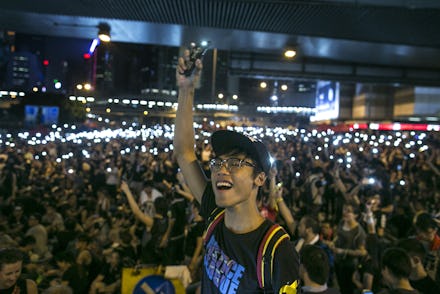Here's the Ingenious Way Protesters in Hong Kong Are Organizing Themselves

How do protesters stay in contact with each other when the government has shut down or censored Internet and mobile networks? Simple: You don't use either.
Meet Open Garden's FireChat, the messenger app protesters in Hong Kong have been using to circumvent government attempts to prevent them from organizing by blocking social networks like Instagram. Instead of relying on a single website or government-controlled networks, FireChat uses a technology called mesh networking for its "Nearby" chat mode.
There are no servers, cell phone towers or satellites involved. Each phone connects to others running the program using direct, peer-to-peer connections like Bluetooth and WiFi, enabling them to trade messages. It's the digital equivalent of passing a paper note around a classroom.
Here's what it looks like in action:
How does this effect Hong Kong? According to VentureBeat, if enough people use FireChat at once, it's more or less impossible to stop users from communicating without seizing all of the phones or jamming the signals. For protesters, this means that as long as enough phones remain in range of one another, there's no way to prevent them from organizing.
In Hong Kong, where student-led activists are protesting a central government clampdown on civil elections, FireChat is already seeing widespread use. From VentureBeat:
FireChat users in Hong Kong were involved in more than 800,000 chat sessions over the past day, Open Garden chief marketing officer Christophe Daligault told VentureBeat in an interview. And, on average, they spent about three and a half minutes in a conversation (about 45 seconds more than people in the U.S. and U.K.).
The surge of interest from Chinese activists blindsided the company, which reports 100,000 new users in Hong Kong registered on Sunday alone. Activists say that the app is a way to work around the various ways in which the police or government-controlled telecommunications networks can collude to isolate them.
"I know it can connect with people around me without using the Internet," 18-year-old student Audrey Chan told the AFP. "So I just downloaded it in case the network is down, in case I need to contact the people around me."
"We don't have to use the Internet to get connected with people who have the app, so we can be in touch," another woman added. "There have been groups on Facebook that suggest people download it, during really critical times when the Internet is down."
"I'm afraid that the government will cut down the network, and I want to make sure I have a point of contact with my family," said 17-year-old Sarah Chan. While the Chinese cell phone networks have not yet been switched off, FireChat might be the only way Hong Kong citizens will be able to keep in touch with each other using their mobile devices.
Yet another advantage is that FireChat allows its users to skip over crowded Wi-Fi or cellular networks that could get bogged down if lots of people connect at once, like any one of these people:
While it's currently enjoying its time in the spotlight in Hong Kong, the app could be useful during any government crackdown on protests. For example, FireChat wouldn't have been affected whatsoever by Syrian President Bashar Assad's apparent order to shut down the entire Syrian Internet in May 2013.
Potential drawbacks? The current incarnation of the app lacks encryption, allowing pretty much anyone — including the authorities — to eavesdrop on every post. And it doesn't actually enable users to communicate with specific people just yet, only the entire network. But private messaging, secure data transmission and verified usernames are all in the works.
However, the fact remains that FireChat is one of the few remaining modes of communication for large groups of protesters to communicate in an otherwise closed-off network. According to the Great Firewall, Instagram, Facebook, Twitter and Snapchat are all blocked in mainland China, while popular Chinese social networking sites all operate under the constant specter of censorship.
The 60,000-plus people who showed up in Hong Kong to protest could potentially lose access to these technological tools, but maybe they ultimately won't need them. Quartz reports that the demonstrators have managed to spread their message well beyond the student community, with professionals, teachers, retirees and some trade unionists joining the protests with strikes and boycotts. With regular networks often out of the question to coordinate these activities, an app like FireChat is already proving itself pretty useful.